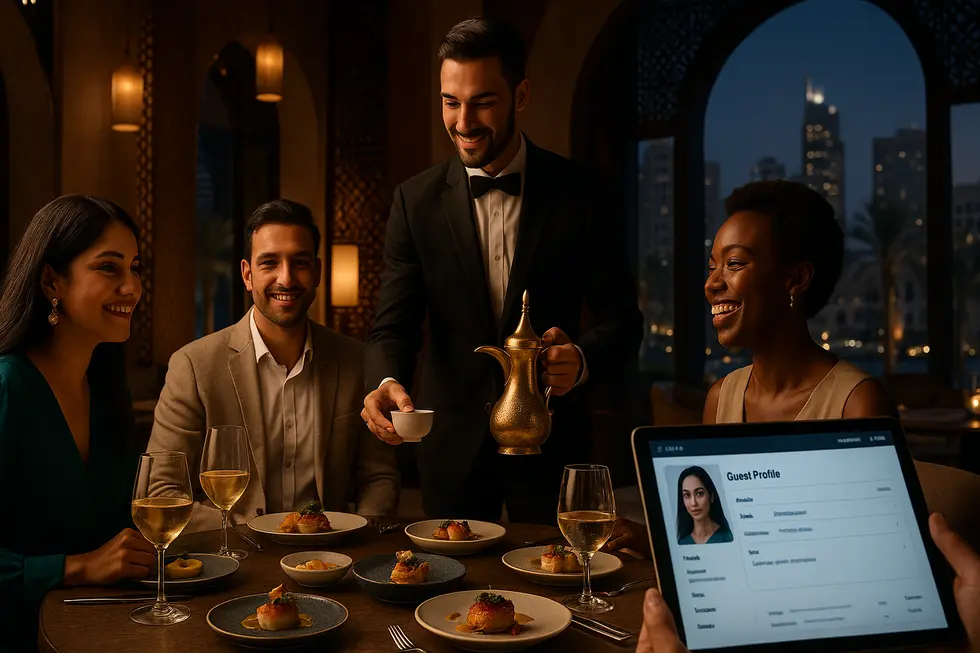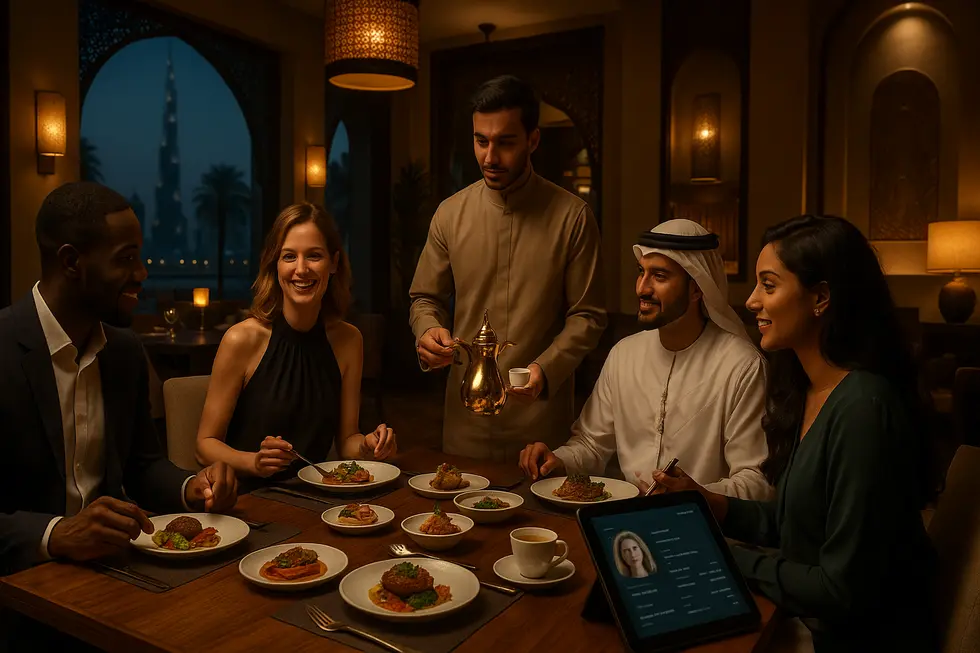Architecting Restaurant Guest Experience in Dubai Hotels for Long-Term Loyalty
Dubai hotels should architect restaurant guest experience with cultural moments, tech personalization, and design to boost long-term loyalty.
Customer Loyalty & Guest Experience
Architecting Restaurant Technology and Operations for Cultural Moments and Lasting Loyalty

1. Operational Tech Blueprint for Signature Cultural Moments: CRM, IoT, AI, Orchestration, Privacy and Staff Enablement
To turn signature cultural moments into enduring loyalty, hotels must weave CRM, IoT, AI and service orchestration into a single operational fabric. A unified CRM builds guest profiles that inform menu suggestions, seating preferences, and dietary notes, while IoT subtly adapts lighting, sound and temperature to cultural cues. AI personalizes timing and recommendations, freeing teams to create warm, human interactions. Service orchestration synchronizes front-of-house and kitchen workflows so moments arrive precisely. Privacy safeguards and transparent consent keep trust intact, and data minimization principles limit exposure. Staff enablement focuses on training staff to interpret insights, use smart tools, and convert routine tasks into culturally resonant hospitality. Loyalty mechanics should reward dining behaviors with meaningful tiers and exclusive cultural access. Digital engagement can be playful yet respectful, encouraging return visits without replacing genuine connection. For practical frameworks on building repeat diners, see F&B loyalty strategies. https://affinect.com/dubai-restaurant-tourist-retention
2. Designing Cultural Moments: Authentic Programming, Inclusion, Sustainability and Multisensory Memory
Dubai hotels can turn restaurants into cultural anchors by weaving authentic programming with inclusive, sustainable practice. Curated gatherings and artist collaborations transform dining into a modern majlis, where storytelling, live craft demonstrations and contextual menu notes create emotional resonance. Staff trained for societal sensitivity welcome diverse guests while interpreting local traditions respectfully. Partnering with local artisans and suppliers embeds provenance into dishes and interiors, signalling environmental and social commitment. Multisensory design—layered lighting, regionally inspired textures, ambient soundscapes and tactile service moments—reinforces memory formation and social sharing. Signature cultural events, timed to local festivals, amplify relevance and create repeatable rituals guests seek out. These strategies must balance authenticity with accessibility so international visitors feel invited, not lectured. Operational alignment across F&B, events and procurement ensures cultural initiatives scale without eroding quality. For practical tactics on F&B loyalty integration, see fnb-build-guest-loyalty. External reference: https://affinect.com/dubai-restaurant-tourist-retention
3. Economic and Geopolitical Playbook for Signature Dining: ROI, Loyalty Economics, Market Diversification and KPIs
To convert signature cultural moments into measurable value, hotels must align emotional design with a rigorous economic framework. Map guest journeys to revenue streams and quantify incremental spend from repeat visits and ancillary sales. Use tiered loyalty mechanics and personalized incentives to raise lifetime value, while tracking net promoter score, repeat-booking rate, average spend per visit and length of stay as core KPIs. Diversify markets to reduce exposure to geopolitical shocks, and model scenarios to prioritise segments with stable yield. Smart tech and feedback loops enable continuous optimisation, turning qualitative memories into quantitative signals. Design experiments that isolate the impact of immersive touches on booking cadence and referral growth. When reporting, present short-term ROI and projected loyalty economics over multi-year horizons to justify investment. For practical tactics linking F&B design to retention, see F&B build guest loyalty. Further reading: https://oaky.com/en/blog/guest-loyalty
Personalization Through Technology and Data-Driven F&B Strategies: Connected Intelligence for Dubai Hotel Restaurants

1. Systems Architecture and Data Flows for Personalized Restaurant Experiences
Connected systems turn guest data into loyalty. A unified architecture links PMS, POS, CRM and loyalty platforms through secure APIs and event streams, enabling real time recognition and predictive personalization across restaurant touchpoints. Cloud storage and AI analytics synthesize preferences, dietary needs and past spend into tailored menus, offers and staff prompts that feel effortless. Mobile reservations, personalized digital menus and ordering reduce friction while post visit outreach keeps relationships active. Loyalty tiers should include meaningful dining rewards to convert stays into repeat restaurant visits. Equally important is staff-facing design: dashboards and discreet alerts empower service without disrupting ambience. Technical choices must prioritize data governance, consent management and interoperability to protect guests and support future features. When architecture is modular, hotels can pilot innovations and scale what works, creating F&B experiences technologically sophisticated and human. F&B build guest loyalty Read more on digital restaurant strategy: https://www.deloitte.com/middle-east/en/Industries/consumer-products/research/gx-restaurant-future-survey-technology-customer-experience.html
2. Turning Guest Data into Loyalty: Tiered Rewards, Pricing and Revenue Optimization for Dubai Hotel Restaurants
Dubai hotels can convert guest data into measurable revenue by designing personalized F&B economics. Connected guest profiles let teams anticipate preferences, allocate covers, and avoid turning away key guests. Predictive analytics segment visitors by dining habits, lifetime value and visit frequency to shape tiered rewards. Well-designed loyalty tiers incentivize higher spend through targeted benefits and time-bound offers. Linking program data with yield management refines menu pricing, staffing and seating plans. Gamified promotions and tailored recommendations increase cover conversion and average check without eroding margin. Staff training paired with data insights ensures recognition feels human, not transactional. Implementation must respect privacy and local regulations while aligning with Dubai’s smart-city digital initiatives. For tactical guidance on building guest loyalty in F&B see F&B build guest loyalty. Read a practical industry case study on data-driven F&B personalization here: https://hotelbusiness.com/fb-spotlight-how-jumeirah-group-leverages-fb-data-to-wow-guests-and-drive-loyalty/
3. Balancing Data, Culture and Compliance: Building Trustworthy Personalization in Dubai’s Hotel Restaurants
Architecting personalized dining means pairing smart data with cultural intelligence and clear compliance. Use digital menus, multilingual interfaces and profile-driven filters to respect dietary laws and guest preferences. Integrate F&B data with central guest profiles so recognition and service remain seamless across venues. Apply CRM and AI thoughtfully: recommend dishes, reduce food waste, and surface meaningful moments without feeling intrusive. Preserve the human touch by using tech to empower staff, not replace them, and train teams to translate signals into warm interactions. Privacy must be explicit: obtain consent, limit data sharing, and store preferences securely to build trust across nationalities. Embed ESG signals into personalization—sustainable sourcing and waste reduction become loyalty drivers when communicated transparently. For implementation guidance, see practical F&B loyalty approaches here: F&B build guest loyalty.
https://affinect.com/dubai-restaurant-tourist-retention
How Should Dubai Hotels Architect Restaurant Guest Experience for Long-Term Loyalty? — Interior Design, Curated Menus, and Staff Cultural Engagement

1. Designing Place and Purpose: Tech-Forward, Sustainable Interiors Rooted in Local Culture
Design should deliver comfort, identity and operational agility. Integrating smart lighting, acoustic treatments and energy-efficient systems creates a welcoming ambiance while reducing costs. Biophilic elements and natural materials calm guests and support wellness expectations. Economically, flexible seating mixes booths, banquettes and bar layouts to serve varied budgets and increase turnover without eroding comfort. Culturally sensitive finishes—Arabic patterns, local artwork and considered circulation—signal authenticity and respect. Technology must be unobtrusive: intuitive control of light, sound and temperature personalizes visits without replacing human warmth. Sustainability choices, from LED fittings to water-saving fixtures, attract eco-minded visitors and lower operating expense. Designers should balance spectacle with intimacy so visually striking features invite social sharing, while acoustics and sightlines preserve private conversation. This integrated approach makes spaces memorable and repeatable, strengthening loyalty through comfort, cultural resonance and efficient service. For practical F&B loyalty tactics, see F&B guest loyalty insights. External reference: https://joanarapadas.com/restaurant-interior-design-trends-in-dubai
2. Curated Culinary Paths: Tech-Enabled, Sustainable Menus That Build Guest Loyalty
Curated menus should act as loyalty engines, blending personalization, value, cultural authenticity and sustainability into a coherent guest journey. Using guest profiles and real-time trends, kitchens can rotate tasting menus that respect dietary rules and local palates while showcasing regional ingredients. Price structure balances exclusivity with accessibility: signature sharable plates justify premium spend, while curated bundles invite repeat trial. Loyalty incentives linked to dining spend deepen economic value and encourage exploration. Geopolitically aware sourcing diversifies suppliers, reduces risk, and signals ethical stewardship through local, traceable produce. Societally, menus become storytelling vehicles: chef narratives, staff-led anecdotes, and brief dish explanations educate and build emotional bonds. Technology enables interactive touches without replacing human warmth—digital menus that suggest pairings, record feedback, and feed loyalty profiles. Training empowers staff to translate cultural context into memorable moments. For practical guidance on building F&B guest loyalty see this resource and external analysis: https://affinect.com/dubai-restaurant-tourist-retention
3. Embedding Cultural Competence: Staff Training, Inclusion and Loyalty Systems for Dubai Restaurants
Staff are the bridge between cultural authenticity and sustained guest loyalty in Dubai's restaurants. Investing in continuous cultural competence training, inclusive hiring and visible respect for societal practices creates a workforce able to read and respond to diverse guests. Use tech-enabled HR tools to track national holidays, prayer times and flexible shifts, reducing conflict and boosting morale. Economic incentives - structured recognition, clear career pathways and fair rewards - anchor retention amid a competitive market. Leadership that models ethical, inclusive behavior turns policies into lived practice. Practical measures such as prayer spaces, accommodation for religious attire and celebration of cultural festivals reinforce belonging. When teams feel valued they deliver emotionally resonant service that becomes a loyalty engine: memorable guest moments, positive reviews and repeat visits. For tactical guidance on aligning staff engagement with F&B loyalty goals, see Hotel F&B loyalty strategies. External research on cultural inclusivity in regional hospitality: https://www.scirp.org/journal/paperinformation?paperid=135947
Final thoughts
Dubai 4-star hotels that want long-term restaurant loyalty must orchestrate cultural authenticity, tech-enabled personalization and guest-centric design into a single guest journey. Signature moments create the emotional hook; unified guest data makes each encounter feel personal; interiors and curated menus sustain comfort and discovery. Operationalize these elements with measurable pilots, staff training and iterative design so experiences remain consistent and scalable. The result is a restaurant that not only satisfies during a stay but becomes a reason guests return and recommend the hotel globally. Lets design a guest journey they'll never forget - start the conversation now.
About us
Markus Mensch is a strategic marketing consultancy specializing in hospitality and F&B brands, with offices in Dubai and Germany. Since 2007, the company has supported over 1,000 businesses in increasing visibility, guest loyalty, and revenue - without relying on paid ads. With the proprietary OBC-Strategie®, Markus Mensch and his team provide structured, result-oriented solutions tailored to 4-star hotels and restaurants. The company combines marketing expertise, industry experience, and hands-on implementation to help clients achieve sustainable growth. Made in Germany - Built for Dubai
Transform Your Hospitality Business Today
Are you ready to boost your revenue and enhance guest loyalty? Let's get started!

